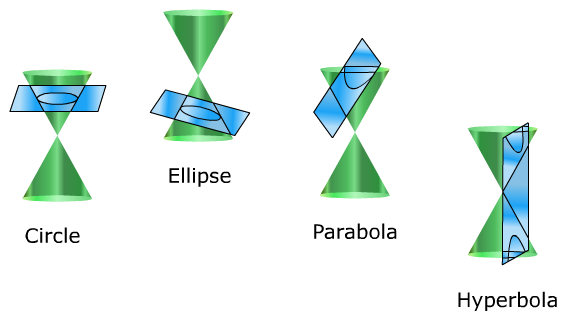Conics: Classifying from General Equation

Circle - the intersection of the cone and a perpendicular plane.
Ellipse - the intersection of the cone and a plane that is neither perpendicular nor parallel and cuts through the width of the cone.
Parabola - the intersection of the cone and a plane that is neither perpendicular nor parallel and cuts through the top and a side of the cone.
Hyperbola - the intersection of a cone and a plane that is parallel to the cone and cuts through the top and bottom of the cone.
Each conic section has a unique standard equation but all of them can be described by the general equation:
GENERAL EQUATION OF A CONIC:
where A, B, C, D and E are constants.
The values of the constants A and C in the general equation reveal the type of conic the equation is describing.
CLASSIFYING A CONIC FROM GENERAL EQUATIONS:
2. Parabola: AC = 0 where A = 0 or C = 0 but not both
3. Ellipse: AC > 0 where A and C have like signs
4. Hyperbola: AC < 0 where A and C have unlike signs
This test only applies if the graph of the equation is a conic. It does not apply to equations that have no real graph, such as x2 + y2 = -1.
Let's use these classification rules in some examples:
a) b)
|
Step 1: Classify equation by determining the values of A and C and applying the general equation rule. Because the equation has no y2-term, c = 0. |
A = 5, C = 0
Apply Rule: Because AC = 0 and both A and C are not zero, Rule 2 applies. The graph is a parabola. |
|
Step 2: Classify equation by determining the values of A and C and applying the general equation rule. |
A = 6, C = -2
Apply Rule: Because AC = -12 < 0 and A and C have unlike signs, Rule 4 applies. The graph is a hyperbola. |
a) b)
|
Step 1: Classify equation by determining the values of A and C and applying the general equation rule. |
A = 3, C = 3 A = C Apply Rule: Because A = C, Rule 1 applies. The graph is a circle. |
|
Step 2: Classify equation by determining the values of A and C and applying the general equation rule. |
A = 4, C = 2
Apply Rule: Because AC = 8 > 0 and A and C have like signs, Rule 2 applies. The graph is an ellipse. |
|
Related Links: Math algebra Component Form and Magnitude Scalar Multiplication and Vector Addition Pre Calculus |
To link to this Conics: Classifying from General Equation page, copy the following code to your site:
